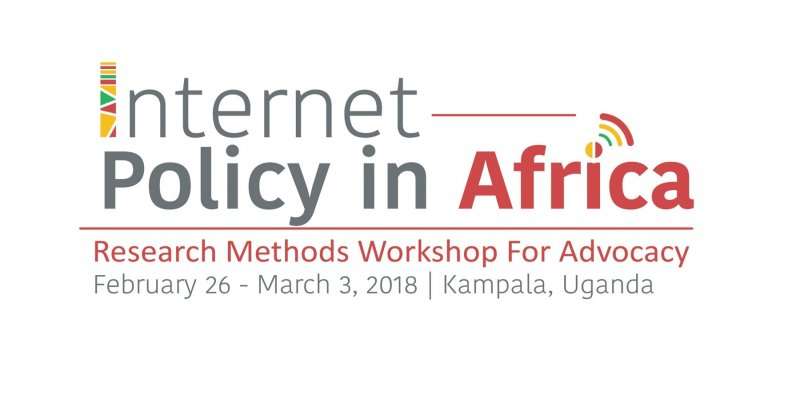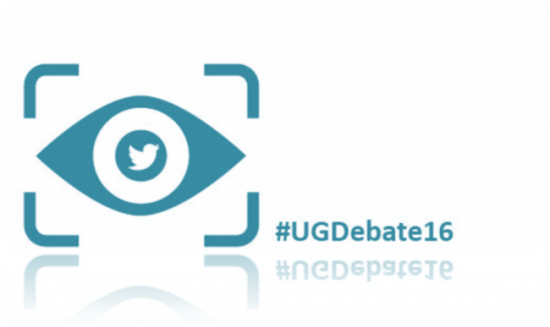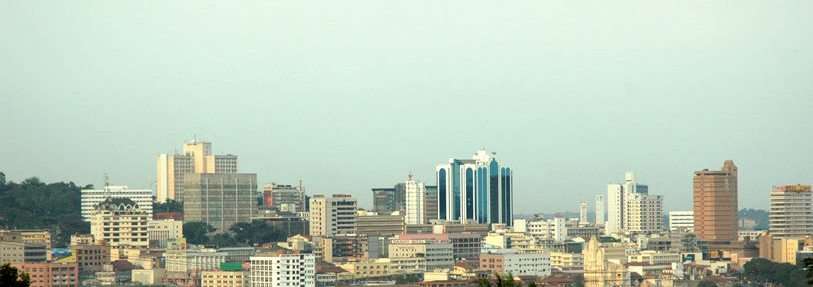Call For Proposals |
A coalition of prominent internet rights policy and civil society advocates are pleased to issue this open call for proposals for a consultancy on “Mapping and Making Available Evidence-Based Research for Internet Policies in Africa.”
This international Call for Proposals invites submissions from researchers, academicians, scholars, and professionals. Successful proposals will help involved organizations to overcome the limited availability and accessibility of evidence-based research regarding internet policies in Africa to nurture public debate and due consideration by policy makers within the region.
The details of this Call for Proposals, including application instructions and timeline, may be downloaded. Applications must be submitted by March 25, 2018. Chosen proposal will be announced within April 2018. Requests for clarification and submissions, please sent to Alberto Cerda at [email protected]
This coalition includes Article 19 Eastern Africa, BudgIT, the Centre for Intellectual Property and Information Technology Law at Strathmore University (CIPIT), Co-Creation Hub, the Collaboration on International ICT Policy for East and Southern Africa (CIPESA), iHub, the Kenya ICT Action Network (KICTANet), and Paradigm Initiative, with the support from the Ford Foundation´s Internet Freedom Program.
Advancing Internet Policy Research in Africa
By Juliet Nanfuka |
The conversation and actions on internet related policy in Africa have grown in recent years as has the appreciation of its impact on internet users. However, research to support advocacy for improved internet policy development on the continent remains relatively low despite a growing internet penetration and its resultant impact on the continent’s social, economic and political scenes. This has led to the need to train, connect, and build collaboration between researchers, policy makers and internet freedom advocates across the region.
Accordingly, between February 26 and March 3, 2018, an intensive African regional training on Internet policy research methods will be held in Kampala, Uganda. Hosted by the Annenberg School for Communication’s Internet Policy Observatory and the Collaboration on International ICT Policy for East (CIPESA), along with several partners from across Africa, the six-day program is aimed at building collaborative possibilities across sectors, expanding research capacity within the practitioner and digital rights advocacy communities, as well as providing the skills to strategically use research and data to advance advocacy efforts. Ultimately, it aims to improve working synergies between emerging African networks of civil society organisations, academic centres, technologists and think tanks.
We look forward to a week long exchange of insights & ideas at the #InternetPolicyAfrica workshop next week. Follow the hashtag from Feb 26 – Mar 3 to gain some tips on how to advance #Internetfreedom #Access #OpenData #FreedomOfExpression #InternetMeasurement & more in Africa! pic.twitter.com/FgQwZUg2jq
— CIPESA (@cipesaug) February 23, 2018
The workshop is designed as an intensive practicum, covering both quantitative and qualitative methods as well as offering case studies which illustrate how to strategically use research for advocacy and policymaking. It will also entail theoretical and practical sessions on a range of topics including legal analysis, survey methods, social network analysis, strategic communication, data visualisation, and network measurement.
Past workshops in the Middle East, Asia, and Latin America were successful in equipping a diverse group of participants with the skills needed to understand how to frame research questions, understand various qualitative and quantitative research methods, and collaborate across disciplinary and professional silos.
Following a public call for applications which was launched at the Forum on Internet Freedom Africa 2017, over 400 applications were received from across Africa. A total of 40 applicants – representing 17 countries – with diverse skills and professions including journalists, lawyers, researchers, technologists, academics and government representatives were successful. The represented countries include Burundi, the Democratic Republic of Congo, Gambia, Ghana, Ethiopia, Kenya, Liberia, Malawi, Namibia, Nigeria, Tanzania, Rwanda, South Africa, South Sudan, Uganda, Zambia, and Zimbabwe.
Among the participants is South Africa based Yolanda Mlonzi, co-founder of the Southern African Emerging Leaders in Internet Governance (SAELIG), who notes that, “We find ourselves in an exciting yet critical time, where we have the opportunity to set our own standards and shape internet policy for the better. The workshop presents a great opportunity for learning, to stretch my current positions on internet policy in Africa and most importantly, to start thinking of ways to contribute to quality research that seeks to advance the notion of understanding internet policy through the human and digital rights framework.”
Gambian Demba Kandeh, a journalism and digital media lecturer at the University of The Gambia, echoed Mlonzi’s sentiments on research-driven policy development, noting: “Making impact with research is key but often difficult … there is an opportunity for relevant stakeholders across the continent to seize the opportunity to advance well-researched policy options for the region.” Meanwhile, Namibian researcher and journalist, Frederico Links, pointed out the current gaps affecting strong policy formulation stating that, ”the African internet-related policy space is woefully underdeveloped and weak, and reflects both a severely limited state sector understanding of internet and technology related matters, as well as significant cross-sectoral capacity constraints.”
The workshop will include faculty from the Annenberg School for Communication – University of Pennsylvania, Alliance for Affordable Internet – World Wide Web Foundation, CIPESA, DefendDefenders, Department of Media Studies at University of Virginia, Human Rights Network for Journalists (Uganda), Internet Policy Observatory, Kenya ICT Action Network (KICTANet), Lynchburg College (USA), Makerere University College of Computing and Information Sciences (Uganda), Medic Mobile, Media Legal Defence Initiative (MLDI), Open Observatory of Network Interference, Open Technology Fund, Paradigm Initiative, Pollicy, Research ICT Africa, Social Media Exchange (SMEX), Small Media and Unwanted Witness.
Follow the #InternetPolicyAfrica hashtag for updates on the workshop. Remember to follow the organiser Twitter accounts too – @InternetPolicyO and @cipesaug
You can also share your vision for the future of internet use in Africa using the #InternetFreedomAfrica hashtag
Bridging Cyber Security Gaps: SMEs Trained in Uganda
By Edrine Wanyama |
Uganda’s Small and Medium Enterprise (SME) sector is credited with contributing 20% to the country’s Gross Domestic Product (GDP) in 2016. While the level of adoption of technology as a key component of operations within the sector remains unclear, its effective utilisation requires entities to also embrace safety and security measures as a priority.
Identifying security controls to defend against cyber threats and data protection thus formed the basis of discussions at a cyber standards training workshop for SMEs in Uganda. Organised by the National Information Technology Authority (NITA-U) in collaboration with the Commonwealth Telecommunications Organization (CTO), the workshop, held in Kampala, Uganda on August 23-24,2017 targeted SME entrepreneurs, banking industry officials as well as ICT sector representatives from non-government organisations and other ICT stakeholders.
The workshop explored the Information Assurance for Small Information Assurance for Small to Medium Enterprises (IASME) which encourages SME’s to comply with international information security management standards
Possible risks include; theft of data for monetary gain or competition by criminals, hacking, physical insecurity to staff and office equipment, malware attacks, insecure configuration, updating software from unreliable sources, access control and spam.
Discussions on information security are abound in Uganda as the Data Protection and Privacy Bill, 2015 makes slow progress in Parliament while laws like the Computer Misuse Act, 2011, The Electronics Signatures Act, 2011 and the Electronic Transactions Act, 2011 do not fully address the issue of data protection and privacy.
According to a 2016 report based on a global survey of cybersecurity managers and practitioners, cyber security and information security is considered a technical issue rather than a business imperative. The findings of this study echo sentiments held by civil society organisations which face similar digital security threats including increasingly sophisticated threats and rate of incidents according research conducted by the Collaboration for International ICT Policy in East and Southern Africa (CIPESA). It revealed that various CSOs were concerned about, or had been victims of hacking attempts on their email accounts and internal networks, that they had been targeted by phishing emails, and that they feared their activities were being surveilled by authorities
In order to be better positioned to address cyber threats, civil society and SME need to be equipped with skills encompassing both online and offline responses. These include knowhow on policy and compliance, physical environmental protection, risk assessment, access controls, incident management, monitoring, backup, malware identification and technical intrusions.
Through a cyber essentials course and practical exercises, participants at the workshop were equipped with basic skills for enabling non-technical users to establish five information security controls including malware protection, access control, patch management, secure configuration, boundary firewalls and internet gateways.
As a follow-up to the exercise, selected participants will undergo further training for possible contracting as IASME information security assessors for SME’s. CTO’s international events and seminars are conducted in all countries of the Commonwealth, across the continents of Africa, Europe, the Americas, Asia and the Pacific region. Specifically, in Africa, the events have been held in Botswana, Cameroon, Ghana, Kenya, Liberia, Mozambique, Nigeria, Papua New Guinea, South Africa, Swaziland and Uganda.
Analysis of Twitter Activity During the 2016 Presidential Debates in Uganda
By CIPESA Writer |
The 2015/2016 electioneering season in Uganda set a precedent in the use of social media as a means for politicians to reach out and engage with citizens. It was the first time in Uganda that a candidate announced they would run for President via YouTube and also saw candidate Yoweri Museveni (the incumbent) seek out a more tech-savvy media team to keep abreast with the widening channels of civic engagement.
While some of the candidates maintained personal Twitter accounts and actively engaged in the online conversations, others remained dormant, although they had Twitter accounts.
In partnership with Outbox we present the first of a three-part series into the key themes shaping the online conversation of Ugandans during the electioneering process.
The report explores the level of Twitter activity, interaction and conversational trends with specific focus on the #UgDebate16 hashtag during the 1st presidential debate held on January 15, 2016 and 2nd debate, which was held on February 13, 2016. During both debates, the hashtag trended locally and gained popularity as far as South Africa.
See the full report here: Analysis of Twitter Activity During the 2016 Presidential Debates in Uganda – Monitoring Uganda Elections Series 01 #UgDebate16
Google Launches Wifi Project to Ramp up Broadband Access in Kampala
By Ashnah Kalemera |
Two years since launching a project to provide high quality broadband through shared fibre infrastructure in Uganda, Google has now officially launched the WiFi based Project Link in the Ugandan capital, Kampala.
The internet giant has set up WiFi radios and supporting infrastructure at 120 locations within the city to provide citizens and small media businesses (SMEs) with high speed, affordable and reliable internet services “on the go” and at home.
The initiative aims to help local providers access high-capacity networks at a lower cost due to the opportunity to share infrastructure rather than construct their own. In partnership with the Kampala City Council Authority (KCCA) and property services companies among others, Project Link WiFi services are available at shopping malls, sports grounds, apartment complexes and office blocks.
“Google built the network and access points. We operate and monitor it,” said Ela Beres, a Google official. The ISPs and MNOs participating in the project are responsible for the quality of service, determining pricing and providing support to end users.
As at June 2015, Uganda had 36 licensed public service providers for voice and data services. Internet penetration stood at 37% and telephone penetration at 64%. In 2014, the country was ranked 15 out of 51 countries surveyed in the global internet affordability index. The index measures the affordability of internet access in each country as influenced by the extent of infrastructure deployment, adoption rates and existing policy and legislative frameworks.
According to Suzan Kitariko, Google Uganda Country Manager, since its launch in November 2013, Project Link has seen the laying of 800 kms of broadband fibre in Kampala and the surrounding areas of Entebbe and Mukono. This has enabled 13 local ISPs and mobile network operators to provide high quality broadband to an estimated two million people.
“Google Infrastructure has allowed us to focus on our core competences and cut on capital expenditure, thus reducing costs to benefit the consumer,” said Roger Sekaziga of Roke Telkom, one of the project’s partners. Roke Telkom has deployed unlimited Wifi spots at select restaurants and bars at speeds of up to 1mbs for UGX 18,000 (US$ 5) per month or UGX 1,000 (US$ 0.30) per day.
Speaking at the launch which was held at the Protea Hotel on December 3, Uganda’s Minister of Information and Communication Technology (ICT) John Nasasira said improved access to reliable and affordable broadband connectivity had the potential to positively impact Uganda’s health, education, agriculture and business sectors. He added that it would also contribute to government-citizen engagement. Nasasira called for more public-private partnerships in telecommunications infrastructure development to “boost uptake and narrow the digital divide in the country.”
Meanwhile, leveraging on Project Link, panoramic views of tourist and leisure sites in Kampala are now available via Street View. Work is underway to extend coverage to national parks. Project Link is also supporting the regulator, Uganda Telecommunications Commission and KCCA to draft guidelines for infrastructure sharing for all licensed operators.
Over the coming months, Project Link is expected to expand WiFi access to 300 other locations across the country. Since launching its first metro-fibre network in Kampala in 2013, Project Link has expanded to Ghana in West Africa, where it expects to build 1,000 kms of metro fibre.





